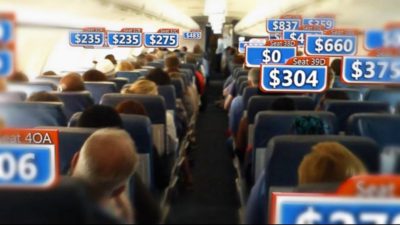Big news in the airline revenue management space! NBC (and many other news outlets) trumpeted today that United has a new plan for reselling overbooked passenger seats. At first, I was highly annoyed by this sensational and inaccurate headline. You don’t want to sell overbooked seats again (resulting in more overbooking); you want to get those passengers off the plane! But semantics aside, getting people off the plane is exactly what technology startup Volantio promises to do, and this is a lot more exciting than the idea of reducing overbooking (which this technology doesn’t affect).
One of the absolute key principles of revenue management is that you’re dealing with limited capacity and expiring inventory. If Amazon doesn’t price a book appropriately one day, they can always try again to sell it the next day. But if a plane goes out with empty seats, the airline is never going to be able to sell those empty seats after the flight has flown. This results in some really interesting yield management strategies as computers and analysts try to figure out how to sell the right number of seats at the right time and at the right price point to maximize revenue.
While I’m not going to get into all the basics of revenue management, suffice to explain that if a revenue management analyst sold out the plane a week before departure (even at a relatively high ticket price), they’d likely be leaving money on the table. Many flights take last-minute bookings whose ticket price may be exponentially larger than the cheap seats that were being sold earlier in the booking curve. Airline yield management essentially plots booking curves of how many passengers should be booked at any given number of days to departure, so they can track whether a flight is performing better than expected (close the cheap fare classes!) or worse than expected (open up more seats in the cheap fare classes). As a result, you’ll find yield analysts discussing the “mix” of fare classes sold on each flight, and trying to ensure that it’s appropriate based on the strategy they’ve devised.

Even if a flight isn’t yet sold out, a savvy yield analyst knows when they’ve sold some early seats in too low of a fare class. Today, there’s really nothing to be done except learn better for next time… but this is where Volantio’s Yield Boost technology comes into play.
On Volantio’s website, they describe Yield Boost as providing the ability to “Dynamically rebalance flights by reacquiring low-yielding inventory and reselling it at a higher price”. To translate that into layman’s terms: Volantio’s technology, branded “Flex-Schedule” for United, will offer to buy back a seat that it thinks was sold too cheap, so that they can sell it to someone else for a higher ticket price. (If that still doesn’t make sense, Skift has a great piece explaining the various permutations of how Flex-Schedule works, and Brett Snyder at CrankyFlier did an article explaining the benefits to the traveler.) This ability to resell seats is a huge gamechanger for revenue management in several ways.
First, as Skift points out, United will now have the ability to reroute customers – potentially to the benefit of both the airline and the traveler. Let’s say you booked a dirt cheap one-way flight from Chicago to Denver to Seattle, all for just $150. You don’t really want to go to Denver (though I have no idea why not), but the price was cheaper than going nonstop. But now, that Chicago-Denver leg is filling up (with all the smart travelers who know the best place to go), and United realizes that they could easily sell your Chicago-Denver seat for $800 to a business traveler. So they’ll give you a $250 voucher (more than you even paid for your original ticket) that will ensure your repeat business for potentially even more money beyond the voucher, plus they’ll put you on a nonstop Chicago to Seattle flight that was going to have empty seats anyway. You get to travel nonstop and with some money in your pocket, but United gets far more money than that when they’re able to resell your seat. It’s a win for United, and a win for you.
Another indirect consequence of implementing this technology is the ability to deal with “mistake fares”. Oh, how I love mistake fares as a traveler, even as I hate them as someone who works for the airlines! That glorious moment when a pricing analyst fat-fingers a fare and doesn’t realize it, and the computer doesn’t catch it, and I’m able to book multiple roundtrips to Europe for $150 a pop! In 2012, the DOT established clear rules that an airline could not change a ticket price after purchase; in 2015, the DOT changed their policy slightly, and said that airlines don’t have to honor proven mistake fares as long as they reimburse the traveler for any good-faith expenses. But now with Yield Boost, the airlines have recourse when they make small errors in yield (selling a seat on a strong flight in the lowest fare class), rather than only when they make egregious mistakes in pricing (pricing the lowest fare class at $0.01). I think this is pretty interesting, even though it should be noted that mistake fares have become less common anyway these days, thanks to increasingly smart pricing/yield systems that catch errors before they’re published. In a small number of cases, though, the Yield Boost tool could impact the number of mistake fares that actually impact revenue, by pushing those low-yielding customers to flights that were going to go out with empty seats anyway.
But furthermore, it could lead to a really interesting ticket arbitrage opportunity for someone who never intends to fly. Because airlines’ contracts of carriage generally prevent name changes, if you buy a ticket and decide not to fly it, you can’t sell it to someone else who wants to be on that flight. Even if the flight is full, the best you can hope for is to go to the airport (always an arduous process), sit around the gate until departure time, and volunteer to give up your seat at the very last minute – at which point you’ll need to scramble to adjust whatever plans you had made. With the Flex-Schedule program, United might offer you a refund and/or a voucher well ahead of time if that flight turns out to be one where they think they can get more money for the seat. It’s not that I think anyone is going to get rich off buying cheap seats on flights they think will fill up, but the fact that the offer is made several days prior to departure does open this up as an interesting opportunity. And if Volantio opens up this technology to other industries that use revenue management systems, it could prevent things like this hotel debacle in Oregon.
I’ll close by noting that if this whole post didn’t make sense to you, don’t worry – the initial pilot of Flex-Schedule only runs through August, and will be targeting members of United’s MileagePlus loyalty program, who are likely to be more travel-savvy than the average consumer. Furthermore, even when (yes, I predict it’s a “when” and not an “if”) this gets out of pilot, it will likely still be mostly attracting frequent flyers. Since the system will be looking for cheapest seats on the plane, those are probably the bargain hunting frequent flyers who know to pounce on a good flight price when they see it, not the infrequent flyers who book fairly predictably.
Would you take a $250 voucher for a different flight if you found out a few days beforehand? For me, it’s a lot more likely than trying to change my plans during the last minute scramble at the gate when I’m all ready and expecting to go!
